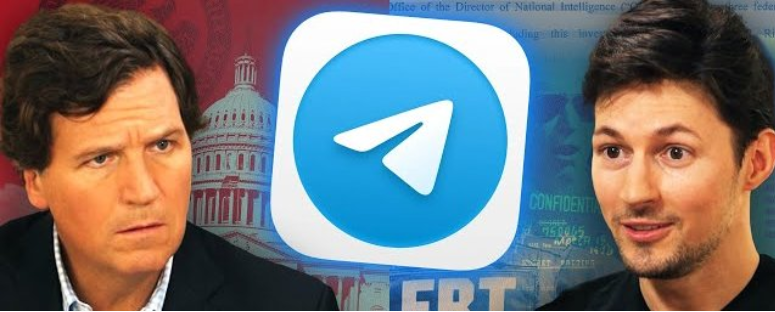
Telegram founder: Taking "freedom of speech" as his mission, considering Musk as his comrade-in-arms, and building a profit model based on TON
When I was discussing the TON ecosystem with @realyanxin last week , he recommended that I must read the interview with Telegram founder Pavel Durov this year. After reading it, I can deeply understand Telegram's mission, the value of TON to Telegram, and why he wants to bullish TON ecosystem, because TON is indeed an indispensable part of Telegram.
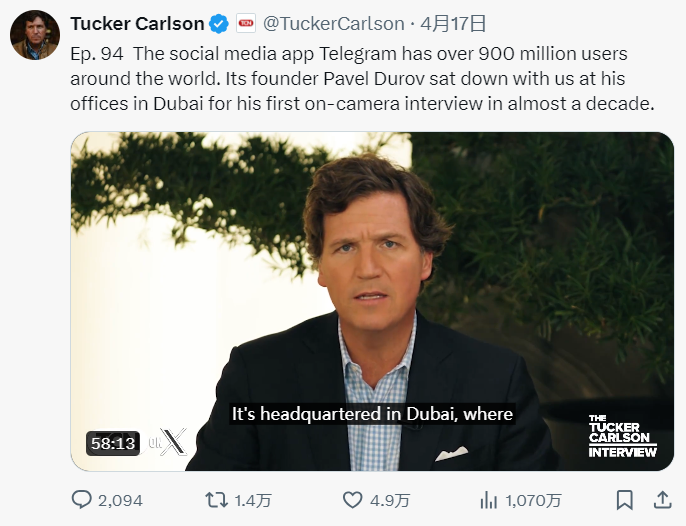
So I watched this interview with Tucker Carlson and indeed had a deeper understanding of Telegram and Ton:
- Pavel Durov’s upbringing has made him pursue freedom all his life, and he also hopes to create a platform to enable others to feel freedom.
- Telegram's mission is to create a platform where users can enjoy "free speech";
- The value of Ton to Telegram: Ton is almost the only way to build profitability under its values , safeguard Telegram's mission of "freedom of speech", and help it develop sustainably.
Below is the essence of the interview I compiled, and also added some background information/Comments/Analysis of TON, divided into 5 parts, Enjoy
- Pavel Durov's upbringing (elite family, centralized power → capitalism, gifted teenager, experimental school, computer programming, Russia-Ukraine conflict, defending freedom of speech) prompted Pavel to go out and pursue freedom.
- The birth of Telegram, based on a lean and efficient small team (a leader in various global competitions) developed excellent features and brought rapid tap water growth
- Pavel Durov starts his digital nomad life and chooses Dubai as Telegram headquarters
- In order to maintain neutrality, Telegram has no external shareholders, but with hundreds of millions of dollars in operating costs each year, it must explore a profit model based on protecting user privacy. This is what TON means to Telegram.
- Some interesting points: receiving contradictory demands from the US government, the biggest pressure coming from Apple and Google, how to deal with surveillance, secure hardware communication equipment
1. Pavel Durov's upbringing (elite family, centralized power → capitalism, gifted teenager, experimental school, computer programming, Russia-Ukraine conflict, defending freedom of speech) prompted Pavel to go out and pursue freedom
- Pavel Durov was born in October 1984 (an interesting year) into a scholar's family in the former Soviet Union, and witnessed firsthand the problems of the Soviet centralized system;
- When he was 4 years old, he moved to Italy with his family. Everything he observed there was in stark contrast to his experience in the Soviet Union. He believed that capitalism and the free market system were better than authoritarianism. The education he received in Italy also made him a part of Europe. The time in Italy was full of fun for him and his brother.
- At age 10, Nikolai Durov was a child prodigy who solved a cubic equation live on Italian television in real time, something that was considered impossible in Italy at the time;
- When Pavel first started school in Italy, he didn’t know a word of Italian and his teachers didn’t think highly of him. But at the end of the first year, he ranked second in his class and first in the second year. This experience made him like the competitive environment and convinced him that as long as he worked hard, he could achieve excellent results.
- In the 1990s, Russia was relatively relaxed (after the collapse of the Soviet Union): Because his father was a famous scholar and writer who studied ancient Roman literature, he was invited to be the head of the Department of Classical Linguistics at the Faculty of Language and Literature of St. Petersburg State University. Russia was different from Italy, but Pavel enjoyed it because there were some experimental schools in Russia in the 1990s that would educate you comprehensively. He learned six foreign languages and the mathematics courses were also very professional.
- Pavel's family brought back an IBM PC XT computer from Italy in the early 1990s, and they became one of the few families in Russia that could teach themselves programming. Pavel was also very keen on programming, and launched an electronic library called Durov.com on the Internet for students majoring in humanities, and created an Internet forum for St. Petersburg University on SPBGU.RU , inviting teachers and students from different departments to discuss. Then, after graduating from university at the age of 21 (September 2006), he founded a company called VK, which was called the "Russian version of Facebook". VK developed very quickly, and in December 2008, it surpassed its competitor Odnoklassniki and became the most popular social networking service in Russia. Its value also grew to $3 billion.
- VK has been experiencing a series of problems since 2011. Because of its adherence to "free speech", VK has become a tool for Russian protesters to organize rallies, rejecting the Russian government's (Putin) demands to shut down opposition communities, and sticking to the freedom of speech and assembly it believes in. When the government demanded the removal of opposition politicians' pages after the Duma elections, Pavel Durov tweeted a photo of a husky in a hoodie, sticking out his tongue, and the text "This is my answer" to let the world know that he would not succumb to pressure.

- In 2013, similar protests took place in Ukraine, and Pavel again refused the Russian government's request to provide the personal information of protesting Ukrainian users. At this time, Pavel faced a dilemma: to succumb to the Russian government or sell his shares. Durov chose the latter and left Russia in 2014, yearning for more freedom and unwilling to be commanded by others.
- In March 2022, Pavel said: "From my mother's side, I can trace my family tree back to Kiev. Her maiden name was a Ukrainian surname (Ivanilenko), and to this day we have many relatives in Ukraine." This may also be one of the reasons why Pavel defends the personal information of Ukrainian users
- Carlson added that Mark Zuckerberg and Prague Agarwal (Twitter's former head of operations) had worked with the government to censor public information.
In addition, Pavel Durov's family are all elites. Father: Valery Durov , a famous scholar and writer who studies ancient Roman literature, was the secretary of the party organization of Leningrad State University during the Soviet era. In the late 1980s, he was invited to teach Russian in Italy. After the disintegration of the Soviet Union, he was invited to return to the Faculty of Language and Literature of St. Petersburg State University as the head of the Department of Classical Linguistics. Mother: Albina Durova, from Kiev, Ukraine, teaches at St. Petersburg State University. Brother: Nikolai Durov, a genius who is proficient in mathematics and computers
- Won gold medals in three consecutive International Mathematical Olympiads (IMO) in 1996, 1997 and 1998;
- From 1995 to 1998, he won three silver medals and one gold medal in four consecutive International Olympiads in Informatics (IOI);
- As a member of the ACM team at St. Petersburg State University, he won the International Collegiate Programming Contest (ACM ICPC) finals championship for two consecutive years in 2000 and 2001. Only 10 people in the world have achieved this achievement.
- He received his first PhD from Saint Petersburg University in 2005 and his second PhD from the University of Bonn in 2007.
- Pavel Durov's right-hand man, CTO of VK and Telegram
Replenish:
- Pavel Durov's growth experience reminds me of CZ CZ@cz_binance . CZ's parents are both teachers, and his father is a professor, which can be regarded as a highly educated family. Shortly after CZ was born, his father was labeled as a "bourgeois senior intellectual" and was sent down for a period of time.
- In the late 1980s, 12-year-old CZ immigrated to Vancouver, Canada with his parents. When CZ went to college, he chose McGill University in Montreal to study computer science, which started his programming career.
- A typical "world citizen", he changes his city of residence every five years on average. He has lived in mainland China, Canada, Japan, the Hong Kong Special Administrative Region of China, and Singapore.
- CZ's sister Jessica Zhao is also very good and was once the managing director of Morgan Stanley
2. The birth of Telegram, based on a lean and efficient small team (a leader in various global competitions) developed excellent features, bringing rapid tap water growth
During his last days in Russia, Pavel realized that every communication tool was unsafe because of various experiences (armed police tried to break into his house), but he needed to contact his brother, so he came up with the idea of developing a messaging app with good encryption, which is now Telegram (iOS version launched on August 14, 2013). Pavel was mainly responsible for writing the user interface, and his brother designed Telegram's encryption algorithm MTProto protocol (still in use today), which led to the trend of "message apps with encryption functions". The Telegram team is very streamlined and efficient
- The engineering team is only 30 people, but they are all very capable, just like the Navy SEALs.
- Based on the original white paper of TON , it can be found that a small half of Telegram's engineering team are former VK employees, and they are also leaders in various global competitions (International College Programming Competition ACM ICPC, International Mathematical Olympiad IMO, International College Data Competition, Top Coder Competition)
- Without an HR department, they created a platform ( contest.com ) to hold engineering competitions (monthly or bimonthly) and select the best engineers to send offers.
- Pavel is the sole owner, director, and product manager of the company. He comes up with most of the features and works directly with every engineer and designer responsible for implementing them (Carlson was surprised)
The secret to staying lean and efficient: independence
- He once told Jack Dorsey (Twitter co-founder) that Twitter only needed 20 people. Jack agreed, but the problem was that once large-scale layoffs began, Wall Street would be uneasy, and retaining these employees was just to maintain the stock price.
- So Elon needs to privatize Twitter before he can lay off 80% of the employees
- So what are the benefits of going public? Pavel thought for a while and answered that it can raise funds more efficiently. So if tokens are used to raise funds, it can also be efficient and create a new evaluation system instead of the current short-term quarterly financial report system.
Telegram has 2.5 million registered users every day, and the growth rate is very fast. There is no marketing investment, and it is completely self-growing. It has 900 million monthly active users
- Pavel believes that the fundamental reason is that "Telegram is a good product. Users are smart and like to use good things, not inferior products. Once users have used it for a while and discovered all the functions of Telegram, including speed and security, they will not leave and will invite their friends to join. These people will realize that the communication tools they used before are 5-6 years behind the times."
- Jobs had a similar view, and I wonder if it influenced Pavel: Our belief was that if we kept putting great products in front of customers, they would continue to open their wallets.
The paper airplane logo comes from an anecdote: Pavel gave a large bonus to a vice president of VK, but the vice president replied that the mission was more important to him than the money, so the two of them folded the money into paper airplanes and threw them down the building.
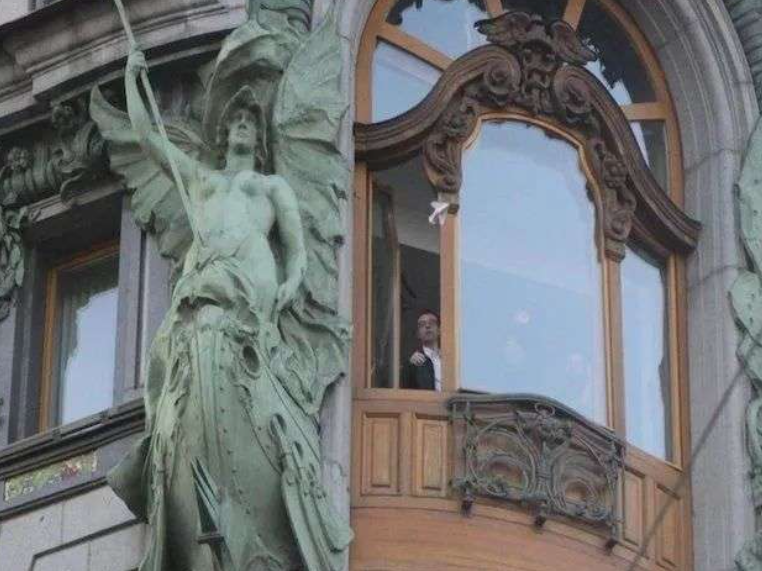
3. Pavel Durov started his digital nomadic life and chose Dubai as his Telegram headquarters
Pavel traveled to Berlin, Singapore, London, and San Francisco, and finally chose Dubai as Telegram's headquarters. The reason for not choosing Berlin was that there were too many bureaucratic obstacles that were difficult to overcome.
- Germany: You cannot directly hire employees from outside the EU. You must first place a job advertisement in local newspapers and magazines. If no German or EU engineers apply within 6 months, you can then hire employees from outside the EU.
San Francisco: I thought I would stay there because there are a lot of technology companies there. Two things made Pavel reconsider.
- The first is safety: Pavel was attacked on his way back to the hotel after visiting Jack Dorsey at Twitter. He was tweeting "I just met Jack Dorsey" on his phone when three big guys snatched his phone away, but Pavel struggled to get it back and ran away. This shocked him, and this is the only city and country where he was attacked on the street.
- Second, he received too much attention from the FBI and various security agencies, "which might not be the right environment for us":
- Every time Pavel goes to the United States, two FBI agents greet him at the airport and ask him questions.
- One morning at 9 o'clock, he was having breakfast in his rented house in the United States when the FBI suddenly showed up and questioned him about the details of his recent situation.
- He even took an engineer to the United States once, and someone tried to hire this engineer without his knowledge, and let this engineer use a specific open source library in Telegram (which was convenient for being used as a backdoor)
Finally chose Dubai
- They came to Dubai 7 years ago. At first they just wanted to live there for half a year to try it out, but they never left.
- It is very convenient to do business in Dubai. You can recruit employees from all over the world and it is easy to apply for a residence permit.
- The tax policy is good
- The infrastructure is excellent. You only need to pay minimal taxes and you can enjoy many excellent facilities: roads, airports, hotels
- More importantly, this is a neutral country, a small country that wants to establish friendly relations with everyone and is not tied to any big country. This is the best choice for a neutral platform like Telegram.
- Comment: Although Singapore is relatively neutral, many people believe that being too close to the mainland is also a hidden danger.
- In the seven years since they came here, although there have been some frictions with neighboring countries, the UAE has never asked Telegram to review user data, which is in stark contrast to previous experiences.
fun fact
- After his experiences in Russia and the U.S., Pavel said he would only go to places that share their values and would not get involved in big countries like China, Russia, and the U.S. This interview was also conducted in Telegram’s Dubai office.
- After leaving Russia, Pavel obtained citizenship (which allows visa-free travel to over 100 countries, including the UK) by donating $250,000 to the Sugar Diversification Fund of Saint Kitts and Nevis in the Caribbean region of Central America, and received $300 million in cash in a Swiss bank, allowing him to focus on creating Telegram.
- After the outbreak of the new crown, the tourism industry in St. Kitts and Nevis was hit, and the threshold for investment immigration was lowered. Forbes also published an article "Passports like Pavel Durov: Caribbean countries lowered the price of citizenship due to the epidemic"
- Pavel currently holds citizenship of 4 countries: Russia, Saint Kitts and Nevis, France, UAE
4. To maintain neutrality, Telegram has no external shareholders, but with hundreds of millions of dollars in operating costs each year, it must explore a profit model based on protecting user privacy. This is the significance of TON to Telegram.
After learning the lesson of VK (sold to Russia by capital control), in order to maintain independence in the early stage, Telegram did not introduce third-party investment institutions, because its mission of pursuing "free speech" is not necessarily consistent with that of investment institutions. At the same time, Pavel can provide funds for the initial operation of Telegram: 10 years ago, his bank account and Bitcoin had hundreds of millions of dollars (10 years ago, he used 1.5 million US dollars to buy 2,000 Bitcoins at an average price of 750 US dollars); he did not buy any real estate, airplanes or yachts, and did not think this method was suitable for him. The first thing in life is his freedom. Once he buys something, he will be bound somewhere. All his energy is on Telegram. But as the number of users of Telegram increases, the annual operating costs of Telegram are as high as hundreds of millions of dollars (it owes 700 million US dollars in debt in 2021). It is impossible to rely on Pavel to provide operating funds all the time, so a series of fundraising methods have been tried . Pavel mentioned the issuance of bonds, but what is more important is the two attempts at blockchain ( Pavel did not talk much about this part, probably because he wanted to keep a low profile due to the influence of the previous SEC. The following parts are all my supplements ):
- In January 2018, Telegram announced the launch of the "Telegram Open Network" (TON), a high-performance blockchain that hopes to expand to millions of transactions per second and provide fast, secure decentralized payments, digital identity and other services to Telegram's more than 500 million users at the time. It raised $1.7 billion through an initial coin offering (ICO) to fund its construction. Participants included Silicon Valley big-name investment companies such as Sequoia Capital, Benchmark, Kleiner Perkins and Lightspeed, and no shares of Telegram were sold.
- This ICO was halted by the SEC in the first quarter of 2020. Telegram returned the funds to TON investors and paid a fine of $18.5 million to the SEC.
- In March 2021, Telegram issued a $1 billion bond with an annual interest rate of 7-8% (seems like an emergency response to the ICO suspension)
- After the SEC halted the ICO, Pavel handed over control of TON to the "community". An open source developer team called NewTON took over the project and changed its name to TON (The Open Network) Foundation in 2021.
- TON was listed on the exchange in the fourth quarter of 2021, when the price was around US$0.8.
- In August 2023, Telegram launched a TON-based crypto wallet during the Token2049 event in Singapore, which can be used by Telegram's 900 million users worldwide. Since then, the price of Toncoin has also started to soar, and both FDV and Market Cap have entered the Top 10.
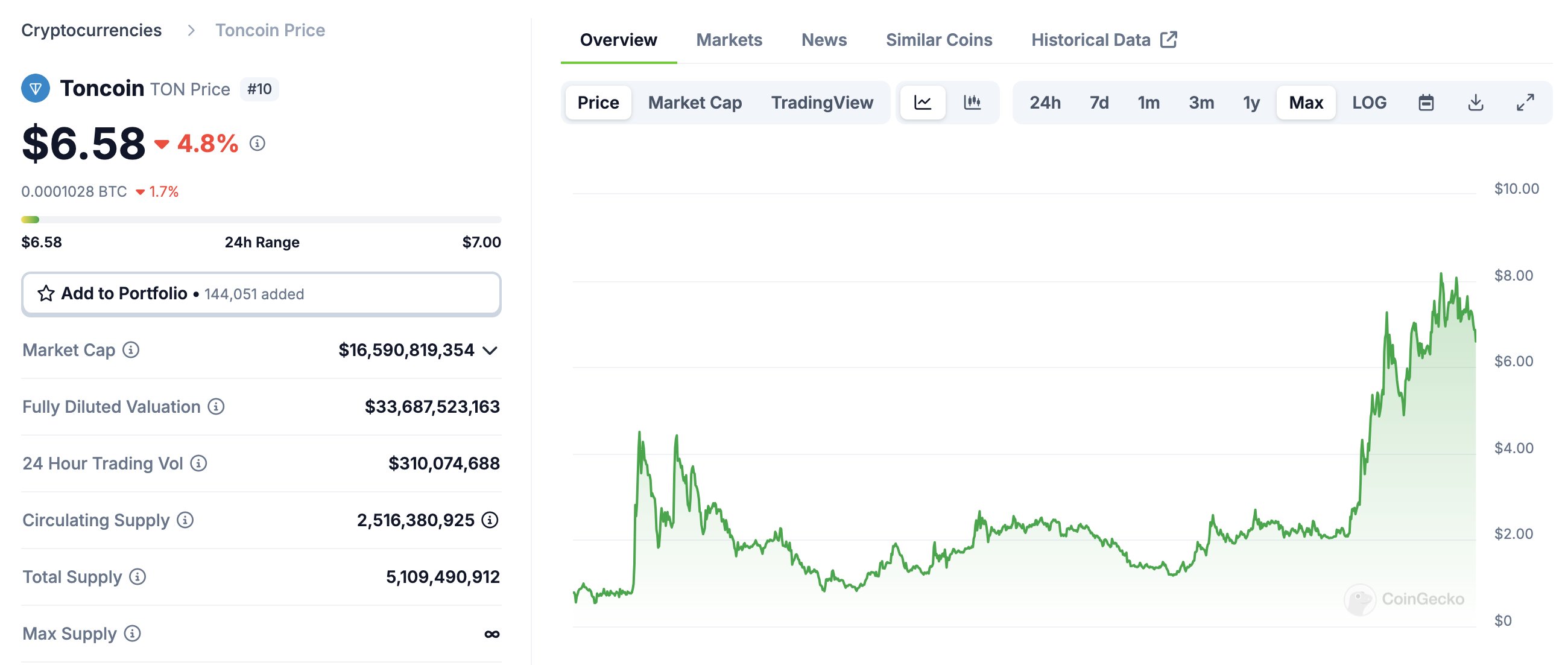
At this point, we should no longer doubt the close relationship between Telegram and TON (btw, the author of the white paper of Telegram Open Network is Pavel's brother Nikolai, who is also Telegram's CTO). TON can build a strong and healthy profit model for Telegram based on protecting user privacy.
- The profit models of Internet platforms can be divided into the following categories: advertising, e-commerce physical sales, value-added services (virtual item sales, membership), and financial services;
- Advertisements generate the majority of profits for social networks such as Facebook and Instagram, but Pavel Durov has been known for not liking ads since his days at VK. On the one hand, they expose user privacy data, directly conflicting with Telegram’s mission, and on the other hand, they provide a poor user experience.
- Currently, Telegram has opened up advertising based on channel subscriptions, but because it cannot open up user privacy data, it will affect the accuracy of advertising, and it is difficult to generate large-scale revenue in a short period of time;
- Back to the essence, Telegram is fundamentally different from Alibaba, Tencent, and Facebook. Telegram cares about anti-censorship and decentralization because of its vision of "free speech". Telegram compares itself to the international version of WeChat. They also have similar product forms, so we can make a comparative reference. Tencent's 2024Q1 financial report shows that value-added service revenue is 45 billion yuan, financial service revenue is 23.9 billion yuan, and advertising revenue is 14.5 billion yuan. Value-added services and financial services combined are nearly 5 times the advertising revenue.
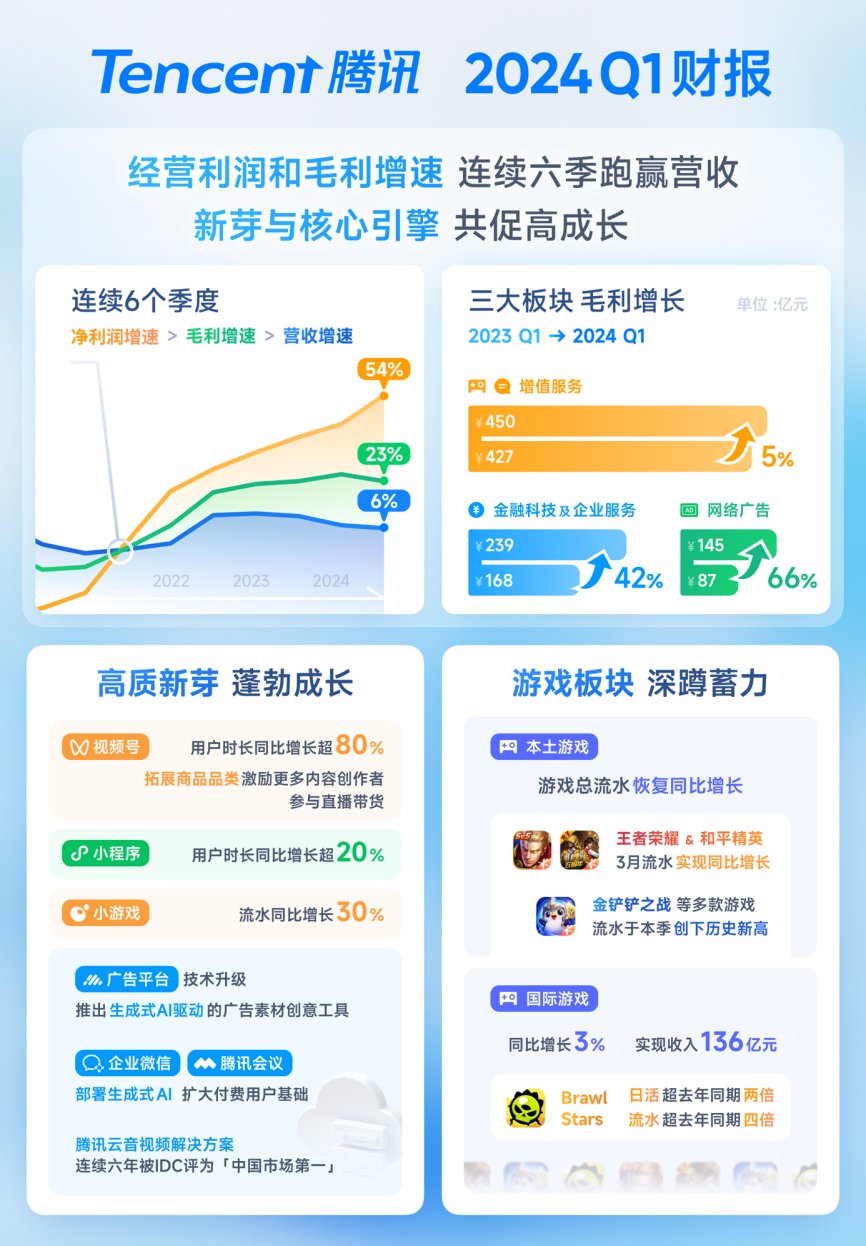
- Its value-added services and financial services are all related to payment. Now it is very clear why Telegram wants to focus on mini-games and support Ton: through the value-added services of mini-games, on the one hand, it can create huge revenue, and on the other hand, it can increase user activity;
- TON essentially enables Telegram to realize the underlying capability of global payment. Why not build its own payment like WeChat? Because on the one hand, a large number of Telegram users are distributed in developing countries and may not have their own bank accounts; on the other hand, this also saves a lot of work in traditional payment integration and supervision. In other words, for the long-tail small countries where a large number of Telegram users are located, each small country has several banks, and traditional payment integration is basically impossible. Only blockchain can quickly realize global payment. So choosing TON is inevitable from a certain perspective. Moreover, the anonymity of blockchain is also consistent with Telegram's vision. It is also mentioned in the biography of Musk that Musk also studied blockchain when planning to build a payment system for Twitter. However, as a US listed company, Twitter has a higher risk of supervision.
- With payment, Telegram has the same two basic functions as WeChat: sending messages and sending money, and establishing various financial services is a natural process.
- Yan Xin has an interesting insight. Based on TON, Telegram can become the first platform that can truly promote the distribution of USDT to 1 billion people, or democratize the interest of US dollars (on the one hand, people with US dollar accounts can easily enjoy an annual interest rate of 5%; but on the other hand, users in many parts of the world do not have bank accounts, and their own currencies are severely inflated).
5. Some interesting points: receiving contradictory requests from the US government, the biggest pressure comes from Apple and Google, how to deal with surveillance, secure hardware communication equipment
Received contradictory demands from the U.S. government
- After the Capitol Hill riots on January 6, 2021 (thousands of Trump supporters stormed the Capitol, resulting in casualties), Pavel received a letter from Democratic congressmen asking Telegram to provide all user information related to the riot. Pavel consulted a lawyer about this request, and the lawyer advised them to ignore it.
- This letter is very serious. It states that if Telegram does not cooperate, it will violate the US Constitution.
- Two weeks later, Pavel received another letter from a Republican congressman, saying that if Telegram provided any of the data requested in the previous letter, it would violate the U.S. Constitution.
- "Whatever we do, it will violate the U.S. Constitution"
- Carlson adds: Facebook has publicly stated that it favors certain movements and certain countries
The biggest pressure comes not from the government, but from Apple and Google
- These two platforms can censor everything you read and access on your smartphone
- You must abide by the rules of these two platforms, otherwise you will be at risk of being removed from the shelves
- These rules are often vague and the platform has the right to interpret
How to deal with surveillance
- Pavel habitually believes that the devices he uses have been hacked. After his experience in the United States, he has very limited confidence in the security of platforms developed in the United States (iOS, Android, Mac OS, Windows)
How will the free exchange of information between individuals develop? Are we heading towards a world without private communications? Will privacy still exist, especially in the age of AI, where technology is becoming more and more advanced?
- Pavel is optimistic and believes that some new secure hardware communication devices will appear in the future, just like hardware wallets are used to store cryptocurrencies now. The world develops in cycles, and people will always get tired of their current lifestyle and move in a different direction.
10 years ago Pavel and Mark Zuckerberg had a private meeting
- Pavel introduced VK's upcoming application platform. In the end, Facebook copied what VK actually did, and he told Maza during the exchange that
- Both said they would not expand into each other’s market, but two or three weeks later, they both did the opposite: Facebook entered Russia, and VK launched a global market.
Finally, Pavel said that Twitter is doing a good job in "free speech" and has the ability to innovate, and he regards Musk as a comrade-in-arms.






